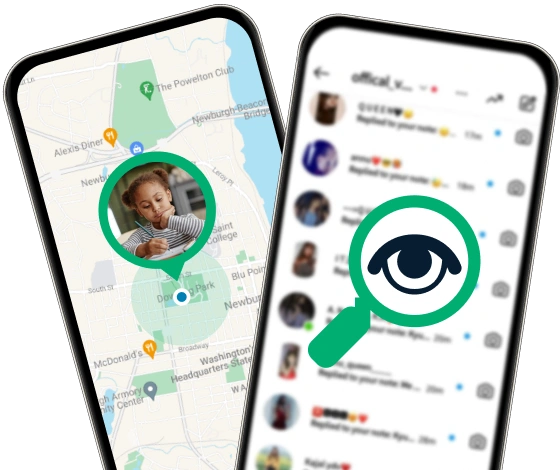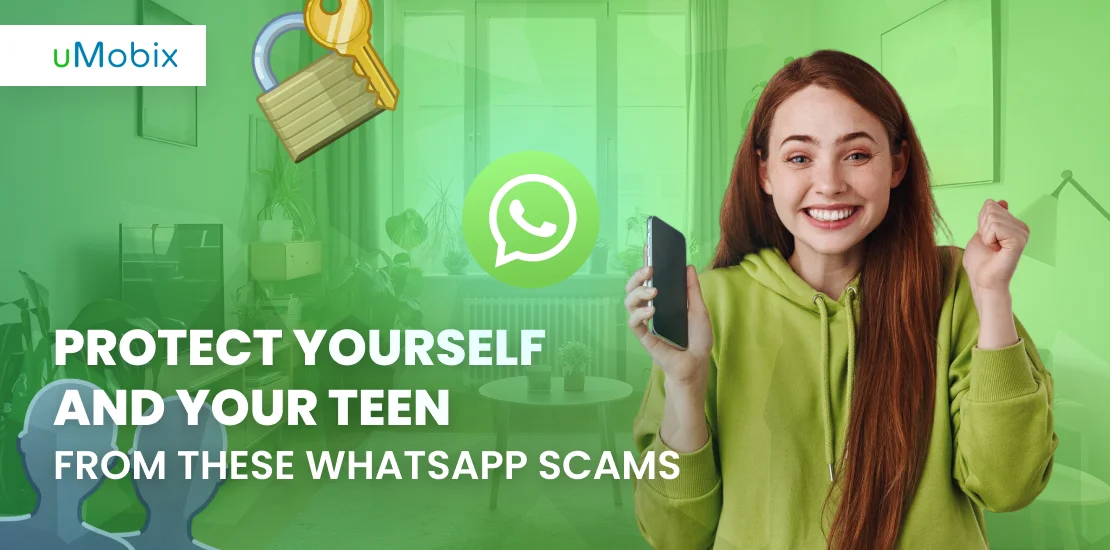WhatsApp is one of the most popular messaging apps worldwide: the number of its unique users has almost reached 3 billion. Such popularity obviously attracts a lot of scammers on WhatsApp. Considering this and also the fact that a lot of children and teenagers use WhatsApp for everyday communication with their peers, classmates, and parents (despite the app’s user age policy), it is important to know how to protect yourself and your close circle from WhatsApp scams. As we have been in the parental control market for over 5 years and know how to protect your loved ones from phone scams, we know how to help you.
Before we dive into the safety precautions and discuss how people can protect their messenger data and personal information from scammers, let’s find out what WhatsApp scams are, what different types of such scams exist, and what they are aimed at.
What Are WhatsApp Scams?
WhatsApp is just a simple messenger app without any fancy features, so what scammers can get there, and why do they actually come there? Well, the WhatsApp scam is something everyone is aware of and warns others about, yet many people become its victims. The main question is: how do WhatsApp scams work?
How Do WhatsApp Scams Work?
WhatsApp scams existed even before WhatsApp itself; they were only known under other names: phone scams, SMS scams, e-mail scams. The idea of such scams is very old: strangers text people on the chosen service offering something and then say that in order to get what is offered, the victim must pay a certain sum, usually not very big.
People are constantly pushed and reminded that the offer is limited and expires in an hour, tomorrow, next week, or whatever, and that if they do not transfer the required sum, they will not get it. The WhatsApp scammer knows the basics of psychology and understands what points to touch and how to force people to make wrong decisions. This is what all scams on WhatsApp are based on.
Can You Get Scammed on WhatsApp?
Can you get scammed on WhatsApp is a rhetorical question; if the answer was “No,” there would not be so many scamming schemes. However, following some simple rules of cyber hygiene we will discuss later helps you avoid becoming a victim of WhatsApp scams, so you have the chance to dodge all of them.
Top 10 WhatsApp Scams You Should Avoid
There are many different WhatsApp scams, but we have highlighted the most popular dozen that you should be aware of and avoid.
WhatsApp Dating Scams

WhatsApp dating scams aim to either reveal your personal information or get some cash from you. As WhatsApp is different from Instagram or Facebook, and there is no way to randomly come across your account (a phone number is required to add someone on WhatsApp), scammers often phish for your contact information on other social media platforms. Here is what such scams usually look like.
- A WhatsApp scammer adds you, makes a couple of compliments, establishes trust, and confesses a romantic interest in you.
- They ask for some money either to “buy a ticket to come and meet personally”, “for medication”, “for mother’s birthday”, or “for any sensitive reason I can invent”.
- Scammers on WhatsApp disappear as soon as they get the money.
When someone you do not know personally starts asking you for money, the first thing you must do is block their account forever.
WhatsApp Crypto Scams
WhatsApp crypto scams are based on pretending to be a representative of a big cryptocurrency stock exchange. Scammers contact WhatsApp users with fake links that phish for their login credentials or fake screenshots of successful investing schemes, offering them the opportunity to deposit their money into a tricky scheme that looks legitimate at first glance. Such scams usually consist of several steps.
- Scammers create a WhatsApp account or group chat that looks trustworthy with official logos of popular cryptocurrency stock exchanges, names of popular personalities dealing with cryptocurrencies, etc.
- They text you about unique opportunities to invest for big profits and offer educational videos and courses on how to earn money with cryptocurrencies, etc. Another option is to send you a phishing link asking you to enter your login details to a certain cryptocurrency stock exchange.
- Scammers set time limits, and the texting they offer is limited in availability. You have a unique chance to make profits with their program, and you are extremely lucky to be chosen for it.
- They disappear as soon as they get what they want, whether it is your login credentials or money. The WhatsApp scam is finished.
The main advice here is to use official and well-known cryptocurrency stock exchanges and never trust any strangers who offer you something related on WhatsApp.
WhatsApp Video Call Scams
WhatsApp video call scams are the quintessence of all other types of scams. Fraudsters often use video calls to gain a person’s trust, ask for money, or steal personal information in the future. One of the most disgusting schemes is when fraudsters call a person and provoke a sincere and open conversation. They record it secretly, and later, they can use such recordings to blackmail people and request more and more money. If you become a victim of such a WhatsApp scam and pay the money for the first time – you are trapped and will be blackmailed again and again. Scammers and online predators call such people “cash cows”. This is how it usually happens.
- Scammers call a person and begin a very polite small talk, slowly moving the conversation in the needed direction.
- They start discussing some private topics and try to provoke people into discussing or sharing experiences.
- At the end of the conversation, scammers announce that the conversation was recorded and start requesting money, or everything becomes public.
Remember yourself and teach your kids never to share anything personal with strangers on messengers.
Mom and Dad Impersonation Schemes
Such WhatsApp scams can be divided into 2 types:
- Fraudsters pretending they are a person’s close relatives or parents and asking for money or
- Fraudsters calling to inform about an unknown relative who has died and left a huge inheritance. To get it, a person needs to send them a certain sum of money (usually not very big, but still reasonable).
In the first case, scammers on WhatsApp play on a person’s love, and in the second, on everyone’s desire to become rich without any effort. Parents or relatives are used in such scams to make them more personal and trustworthy. However, it is always better to call your parents personally or at least ask the scammer to let you talk to them if they are nearby.
WhatsApp Gold Scams

Many scams on WhatsApp make use of people’s desire to be unique and “not like the others”. WhatsApp Gold scam is aimed, like all other WhatsApp scams, at stealing personal information and getting money from people. The idea is that people are contacted by a WhatsApp account, which looks more or less like an official Meta account, and informed that there is an exclusive WhatsApp Gold messenger, and they were chosen to join it (Gold, in this case, means not for everyone). So, here is how it goes.
- Scammers contact people on WhatsApp and explain how great the feature is and that they have a unique and exclusive chance to join it.
- People are asked to open a link the scammers send, which turns out to be phishing or enter their personal information.
- A fee can be requested to register with WhatsApp Gold, or, in some cases, malware gets installed on a person’s device, which starts “mining” for all the personal information they have saved there.
Obviously, no WhatsApp Gold exists, and people who become victims of such WhatsApp scams are left with nothing, so it is better not to believe any “exclusive” offers you get via messengers.
QR Code Scams
One of the most popular WhatsApp scams is the QR scam, which aims to acquire access to someone’s WhatsApp account using the QR login feature. This scam consists of several steps.
- Fraudsters make contact with someone pretending to be a WhatsApp support team member and ask to scan the QR code for any possible reason.
- With this QR code, they phish for the login information.
- Then, they can log into the new account and continue the WhatsApp scam chain by texting people on the contact list, asking for money, and creating even more scams.
The only thing we can recommend here is never to open QR codes sent by strangers, even if they pretend to be officials.
Unauthorized Verification Code Scams
WhatsApp sends a verification code to the phone number linked with an account every time a new login attempt occurs. Scammers on WhatsApp can use this to try to get access to someone’s account in the following way.
- They initiate the login process, wait until the verification code is sent, and then contact the account owner via e-mail, phone, or messages, asking for this code. They can provide various reasons why they need it:
- the code was sent to the wrong number by accident;
- the code is needed for the support;
- the code is needed for something else, etc.
- As soon as a WhatsApp scammer gets this code, they take over the account and can do whatever they want; usually, they start going over the contact list and use other WhatsApp scams, trying to trick other people while hiding under another personality.
A rule of thumb here is never to believe in some random “mistakes” strangers can make and never share any verification codes with anyone.
Lottery Scams
Scammers on WhatsApp have a bottomless imagination, indeed. In addition to all the schemes we have already mentioned, there is also a Lottery scam. Obviously, it is based on people’s desire to get easy money, as in any real lottery, and the scheme looks very similar to other scams.
- A WhatsApp scammer contacts a person and informs them that they have won a certain sum of money (reasonable enough to make people’s hearts beat faster).
- To get it, they need to fill out the form with their personal info and pay a certain deposit or transfer fee.
- As soon as all the required actions are done – scammers disappear.
The only thing we can say here is that any type of lottery is cheating, so better avoid anything related to them.
Call Forwarding Scams
This WhatsApp scam works following a very similar scheme to the previous ones.
- The victim is contacted by the WhatsApp scammer pretending to be a customer support worker or a carrier representative (read about catfishing).
- They are informed about “some bug or issue” and are asked to enter a special code for security or service reasons.
- As soon as this happens, all the calls are redirected to the scammer’s phone, meaning they can even access the victim’s bank account via phone verification.
Like with QR code scams, it is better not to scan anything sent to you by strangers.
Wrong Number Scams
This is one of the most obvious and less successful WhatsApp scams, but it still works sometimes because the scheme is extremely simple.
- A victim gets randomly contacted by someone who says they just called the wrong number.
- Using social engineering techniques, the scammers try to get money or personal details from a person.
This WhatsApp scam only works with people who are not very familiar with technology and are not aware of all the dangers our digital world has. Thus, it is a good idea to familiarize yourself with modern gadgets.
WhatsApp Job Scams

For people who have never faced WhatsApp job scams, it sounds weird. It is hard to imagine how someone who offers a job can scam other people; what will they get? This scheme is extremely simple and is mostly based on getting money.
- A stranger contacts people on WhatsApp with a too-good-to-be-true job offer.
- When that person is already super excited about it – the stranger says that there is a certain application fee or something similar.
The golden rule here is to remember that every job offer that requires you to pay money for it is a WhatsApp scam.
How to Identify a Scammer on WhatsApp

There are several ways how to identify a scammer on WhatsApp, and most of them are based on your attentiveness and critical thinking.
- Random text without a context. If someone you do not know texts you about something you have no idea about or something you do not understand/are not familiar with – be careful because it easily can be a scammer trying to either offer you something you cannot refuse or build trust.
- Suspicious profile. Scams on WhatsApp often use profiles with random pictures from Google or photos of celebrities as their profile pictures. They also do not fill out their profile information and may not even verify them. Thus, a generic and empty profile should be the first alert sign for you.
- Asking for personal information or money. Support agents never ask for such a thing, so if someone pretending to be a support agent or worker of any possible organization contacts you and asks for something like this, it is 99% a WhatsApp scam.
- Great offers. WhatsApp scams often involve offering people something great to make them extremely attracted and excited. Do not lose your cool, though, as offers that are too good to be true are often WhatsApp scams.
- Strange attachments. When unknown accounts send you weird links, remember that it can be phishing, so never open such links. WhatsApp scams often involve getting personal information and credentials, so phishing is a very popular and extremely effective type of scam.
WhatsApp Scammer Numbers
Set it as a rule that potential WhatsApp scammer numbers are all the unknown numbers that suddenly contact you on WhatsApp. There are also a lot of community databases and forums where you can check suspicious numbers and see if the same scammers already contacted other people or if someone else has become a victim of the same Whatsapp scam. If needed, you can check such services as Cybertrace or Truecaller.
Another good practice to avoid being scammed is to report all the unknown numbers as potential WhatsApp scams and let the support service manage this situation and decide/find out if it is really a scammer number or not.
WhatsApp Scammer Pictures
There are a lot of WhatsApp scammer picture techniques used to make scammer profiles more trustworthy and attractive. They may add a lot of pictures with “friends” and “colleagues” to make it look more common and similar to an ordinary person’s profile, and even add a pic with their child or friend for their main profile image. A good piece of advice here is to try doing the reverse image search, for instance, with Duplichecker.
If the WhatsApp scam is based on pretending to be an official of a company – there can be a lot of pictures with the company logo, from corporate events, etc. To make it seem even more real – scammers can even send “official” documents, pictures with the company’s logo, and even some random but serious-looking signatures. The main advice here is always to remember that no matter how serious and real the pictures look, if someone requests you to pay them money, it is a WhatsApp scam.
How to Protect Yourself and Your Teen from Scams on WhatsApp?
Many WhatsApp scams work using people’s innocence and simplicity. Thus, the main way to protect yourself and your close people from WhatsApp scams is to improve the level of technical literacy and follow 3 simple rules:
- do not send money to anyone;
- do not share your personal data with anyone;
- do not open any links from the people you do not know.
Of course, you may never know if a new message you are getting from an unknown number is a WhatsApp scam or not, but to be on the safe side, it makes sense to suggest that all of them are until you can be 100% sure it is not.
If you get contacted by a suspicious number, it is also a good practice to report and block it. WhatsApp has a whole department dealing with potential scammers, so let them do their job and identify who is a WhatsApp scammer and who is not.
Finally, share all these rules with your child. It is essential to explain to them how dangerous WhatsApp scams can be and why it is important to know how to deal with them. It is much better if they are warned and know how to act than if they just find out everything on their own by making mistakes and gaining such unpleasant experiences.
Use uMobix to Protect Your Kids from WhatsApp Scammers
uMobix is the ultimate WhatsApp scam prevention tool, which can help your children avoid becoming victims of vicious cheaters using messengers to trick people. After you install it on your child’s device, you can easily check their phones for WhatsApp scams and prevent any of them if noticed.
To do so, you do not even need to be near your child: uMobix WhatsApp tracker sends all the information about new chats to your online profile, and you can check them whenever and from wherever. This app is compatible with Android and iOS and works in the background mode, so your child won’t be bothered by any popping notifications. They won’t even notice there is something protecting them from WhatsApp scams installed on their device.
Conclusion
It is hard to tell why do scammers use WhatsApp. Most probably, they just use all messengers, including Telegram, Signal, etc., so WhatsApp is only one of many. There are many ways to identify scams on WhatsApp, and if you know all of them, plus you do not send money to anyone and do not share your personal information with anyone – you are mostly safe. uMobix, in its turn, will help you take care of your children. So, do not hesitate and check this app now by claiming the 1-day free trial. Protect your children from scams on WhatsApp!

Latest posts
- 10 Best Apps for Parents to Monitor Social Media: 2026 Guide
- Complete List of Keywords to Block for Parental Control
- Does Telegram Notify Screenshots? Everything About Screenshot Detection
- How to Find Someone’s Deleted Instagram Posts: Complete Guide
- Family Tracking App by uMobix: Keep Loved Ones Safe




